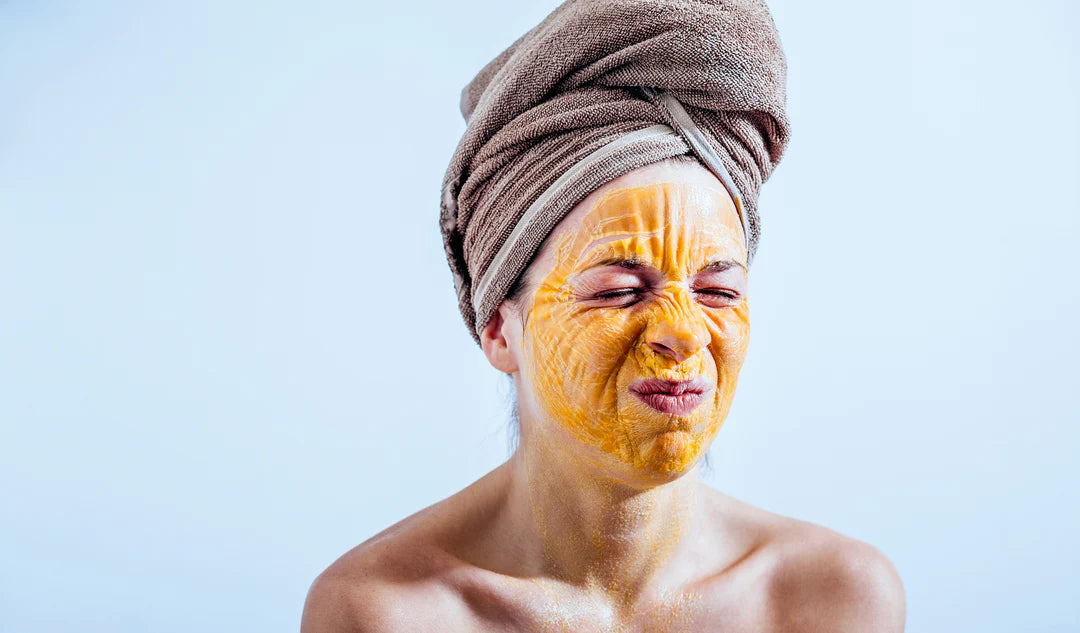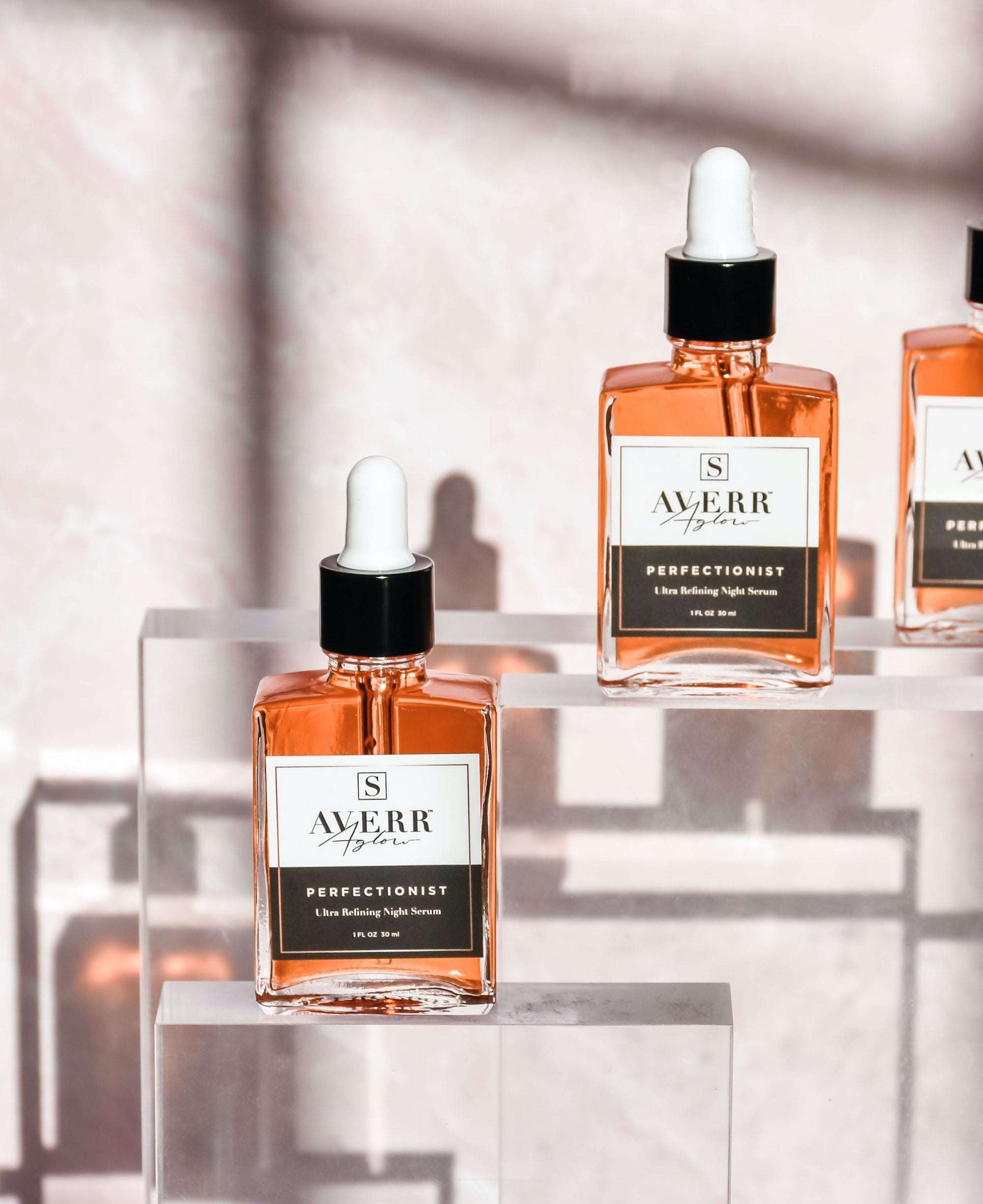
Desperate Things We Tried to Clear Our Skin
We’ve all been there: fed up with breakouts and ready to try any solution, no matter how bizarre. Eager desperation for clear skin leads us to try the latest celebrity trend or TikTok skincare tip. Bloody vampire facial? Great! Skin-burning cinnamon mask? Sign us up.
The things we do for beauty.
And none of us are immune to the promise of a “miracle fix,” as so many of these trends swear to deliver. Clearer skin would be great enough, but what if you could also get it instantaneously and on the cheap? Wouldn’t you try it?
Even experienced skincare pros occasionally cave into temptation and put their skin on the line. Today, we’re looking into skin-clearing “hacks” that lured in members of Averr Aglow’s very own Glow team. What are they? Why are they popular? Do they work?
Plus, the Glow team chimes in to share how our attempts turned out — for better or for worse.
Rubbing Alcohol Instead of Toner
Steph, Fulfillment: I used to clean my face with rubbing alcohol on a cotton pad. It burned. I felt like it was drying my spots, but it dried out the rest of my face, too.
In the constant battle against oiliness and bacteria, you can see why someone might frantically turn to rubbing alcohol as an acne treatment. It dries and sterilizes, right? What more could you want?
This sounds good in theory, but in reality, rubbing alcohol is like bringing napalm to a water balloon fight: an excessive use of force.
Rachel, HR: I used rubbing alcohol as a toner because my friend with bad acne tried it. Very drying!
Reduced greasiness is one thing, but rubbing alcohol strips away your skin’s extra oil and then some. Rubbing alcohol doesn’t care that your complexion needs a certain amount of oil to maintain hydration and defenses. It simply sweeps any oils away, including the necessary ones — leaving your skin overly dry and vulnerable.
No wonder this hack has been reported to cause burning, itching, and flaking skin.
And, as if all that discomfort wasn’t enough, the excessive dehydration from rubbing alcohol can increase your chance of new breakouts and even encourage acne scarring.
The final insult? Rubbing alcohol won’t do anything for non-inflammatory acne like blackheads and whiteheads because it doesn’t unclog pores. So you’re running all these painful risks for a treatment that may not even help. Seems like a poor replacement for a good toner, doesn’t it?
Peel-off Masks
We all saw the viral videos of people trying (and then trying to remove) those peel-off charcoal masks. We saw them scream and squirm, and still, we somehow thought:
Where can we get our hands on that?

The claim behind peel-off masks is that they dry and harden on your face, becoming a stretchy, adhesive sheet that can physically pull dead cells, blackheads, and impurities from your skin. Amazing! Who doesn’t want to see such instant results?
But internet fame aside, peel-off masks aren’t ideal for your face. The powerful adhesives don’t just remove impurities — they also strip your skin of protective oils and healthy skin cells. This can irritate and weaken your skin barrier. Plus, the painful process of peeling these masks away can stretch your skin and damage its elasticity.
Yes, your face may feel baby-smooth at first (after all, you did just rip off a few layers of skin). But you’re also taking a chance with:
- Dryness
- Redness
- Sensitivity
- Breakouts
- Premature sagging
Ultimately, peel-off masks aren’t very effective. And what exfoliation they do provide can be easily accomplished through other, more skin-friendly means.
Sally, Content Team: I tried a random off-brand peel-off face mask. That ish would not come off. And it hurt!
Alanna, Client Services: Me, too! I got some Korean one on Amazon for $7, thinking I hacked the system, lol.
Janice, Client Services: Yes! It did not peel off at all! I was pinching my skin to get it off.
Anna, Content Team: Same! It stuck painfully around my jaw and hairline, and I don’t think it pulled anything out. There were just tiny holes left in the mask where it couldn’t reach into my pores.
Rachel, HR: That was the worst! It did not come off.
Creative Blackhead Extractions
In the same way that peel-off masks lure us in with the promise of expunged, gunk-free pores, other blackhead hacks have a way of catching our attention.
But also like peel-off masks, these tricks may damage your skin instead of cleaning it out.
One of the most popular homemade pore strip alternatives is Elmer’s glue — as in, the goopy white craft glue you used all through elementary school. Remember how you used to let it dry on your fingers and then peel it off? Recall how it perfectly captured every curl and ridge of your skin.
Well, some enterprising individuals experienced this satisfying sensation and thought, “If it worked on my fingerprints, it could work on my pores!” Their suggestion: is to spread Elmer’s glue across your nose (or other blackhead-prone areas), wait for it to dry, and then rip it off like a wax strip.
But most dermatologists caution against this nostalgia-inducing hack, pointing out that it’s unwise to expose your face to anything that hasn’t been tested for use on the skin.
Dave, Fulfillment: I tried to use duct tape as a pore strip. It worked too well — tore my nose off!
Though safe enough for a kindergarten craft project, glue may still contain preservatives that aren’t deemed cosmetically safe. This can be irritating to your complexion, especially with sensitive acne-prone skin types.
And glue isn’t the only blackhead hack to approach with caution — influencers have popped up suggesting everything from gelatin-based DIY pore strips to straight-up duct tape. Spoiler alert: Both of these options can cling and strip your skin.
When in doubt, it’s safer to stick with skin-intended products.
Toothpaste Everywhere
Shiloh, Content Team: I once tried to use toothpaste [for my skin]. I put it all over my face in hopes that it would help my acne and have a magical effect on the discoloration. Have you ever gone to sleep with a sticky face, though? By the time I woke up, things I didn't know were on my bed were stuck all over my face. Lint, hair, scraps of paper, a piece of a feather...I was like, “What the heck!” It was a whole thing.
We’ve all heard (and probably tried) the old toothpaste-on-your-blemishes trick. But how did someone first look at a tube of Colgate and think, “Maybe it’ll shrink my acne”?
Back in the day, many varieties of toothpaste contained triclosan, a chemical that potentially helped kill breakout-triggering bacteria. But now, the FDA is concerned that triclosan may disrupt the natural hormones produced by your thyroid. As a result, triclosan has been dropped from most toothpaste formulas, and its supposed bacteria-fighting benefits are no longer in the equation.
Toothpaste has also been an acne favorite because it contains drying ingredients like baking soda, alcohol, and hydrogen peroxide, which may help shrink a swollen spot. However, these tooth-safe ingredients can be too aggressive for your skin, upsetting its pH balance and even leading to a burning rash.
On top of everything else, toothpaste can even dehydrate your skin. The result is not a cute, dewy look. Those dried-out skin cells can clog your pores and eventually lead to more breakouts instead of less.
Long story short? Toothpaste may seem like a good emergency backup when your regular spot treatment runs out, but it’s not as skin-safe or antibacterial as you hope. You’d be better off shrinking your blemishes with a nourishing clay mask like the Clear Skin Elixir, which pulls out impurities without dryness or irritation.
Alanna, Client Services: I tried toothpaste on my breakouts as a spot treatment because it worked for my friend. It dried out my pimples but was crusty. I ended up picking off my blemishes because the toothpaste dried over the tops.
Rachel, HR: Toothpaste burned my face! I had a scab the next day.
Anna, Content Team: I’m not gonna lie...Before I started using the Clear Skin Elixir, I’d still use toothpaste as a spot treatment when I was desperate. Glad I finally found something better!

Scrubbing, Scrubbing, and Scrubbing Some More
If you’re struggling with an acne-prone complexion, it can seem like your skin is never clean enough. But actually, scrubbing your face can do more harm than good.
Anna, Content Team: Guilty as charged. As a teenager, I loved the movie “Ever After,” and there’s a scene where Angelica Huston talks about scrubbing her face clean. I was worried about acne, so I latched onto this idea and aggressively scrubbed my face with a washcloth for years. Mistake! It gave me terrible dry skin and flaking. I think my face is still recovering.
Heavy-handed exfoliation methods — whether from face brushes, rough cloths, microbeads, or grainy skin scrubs — can shred your healthy layers of skin. This creates tears, weak points, and flaking. These tears then become an entry point for contaminants and an escape route for precious moisture.
And if a washcloth is your preferred scrubbing tool, you may be holding the door open for harmful bacteria. Even if your used washcloth still seems clean when you hang it up to dry, bacteria may already be developing in those damp fibers. So the next time you soap up for a scrub, that washcloth will carry bacteria onto your newly vulnerable skin.
For safer exfoliation, we recommend a gentle, mineral-rich mask that won’t rip up your complexion.
Shiloh, Content Team: I religiously scrubbed with a washcloth until I started working at Averr Aglow. For a while, I missed that squeaky-clean feeling...until I started using our exfoliating mask. Now that I’ve stopped scrubbing, my skin feels less sensitive and inflamed.
DIY Masks & Scrubs
Who among us hasn’t tried at least one DIY mask or scrub? With so many options out there on the internet, it’s hard not to love the idea of glowing skin with a grocery store price tag.
Alanna, Client Services: I applied a cider vinegar face mask with baking soda. It stung my face, and I didn’t even leave it on for the full time. My skin was super dry and dull after. I also tried a DIY oatmeal and egg white face mask. Nothing improved, lol. If anything, it was a waste — I could have made a dessert rather than put it on my face!
Unfortunately, many of these pantry shortcuts aren’t worth the hype. At best, they're disappointingly ineffective. At worst, they may be harmful to your skin.
- Turmeric can stain your face (and pillowcases) with an orange tint
- Even when used topically, raw eggs may expose you to salmonella and other bacteria
- Baking soda upsets your skin's pH
- Cinnamon, fresh citrus, and apple cider vinegar can all burn your skin
- Homemade masks can quickly develop bacteria (even in your fridge)
- Salt scrubs can scratch tiny tears into your skin
We understand the appeal of creating your skincare products with recognizable ingredients. But with so much dangerous misinformation out there, who would you rather trust? Some obscure TikToker, or professional skincare experts?
For familiar botanicals and naturally radiant skin, you can turn to Averr Aglow. Our products are infused with wild-crafted extracts and rare earth oils for clear-skinned beauty that lasts.
If you’ve ever tried an out-of-the-box technique, you’re not alone. We’ve all been there! (Sometimes more than once.)
Swapping anecdotes today, we realized just how easily acne desperation can lead us to some questionable experiments with our skin. But at least we can all learn from (and laugh at) our past mistakes! Hopefully, our experiences will help save you from some of the same missteps we took.
When the temptation of a new skincare hack calls, just remember: healthy skin is beautiful skin! If the latest “hot tip” seems harsh or damaging, it’s not the tip you need. xx





